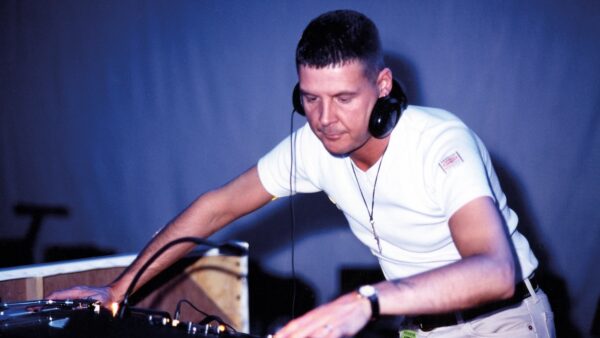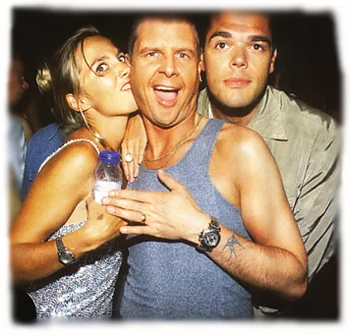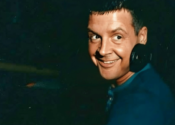
 London’s queer bar/club scene at the beginning of the 1990s entered its most exciting decade to date. The homophobic attitudes of the 1980s had eased somewhat due to the widespread use of ecstasy across the UK during the recent acid house rave years. This combined with a hedonist live-for-the-moment attitude in the queer community reeling from a decade of living with the AIDS virus, and cheap rents resulting from the severe recession. Add to this a million extra UK twenty-somethings from the 1960s baby boom, and you had a perfect cocktail for hedonism. The leader of the pack was Laurence Malice’s legendary queer after-hours club Trade. Founded in 1990, it became the most amazing club on the planet with weekly queues stretching around the block ready for its 4am start on Sunday mornings. The music through the night until early Sunday afternoon ranged from house to techno to hard house, becoming harder and faster as time progressed. Trade also became legendary for reasons other than the music. It was a shirtless melting pot of London’s most beautiful, hedonistic people. A cross section of everyone from everywhere. The whole club was a melee of sex, sweat, muscles, hands in the air, druggy grins, hugs and boggle eyed amazement at the bright green lasers. Trade was a way of life for many people. The only thing that mattered. One of the masters of ceremony was renowned DJ Tony de Vit who reigned supreme at the club from the early 1990s until his untimely death from AIDS in 1998. I can remember his sets in Trade. They were so hard and intense, and that, combined with being in the packed sweaty basement with only one narrow, constantly full, staircase out that took ages to navigate, meant I sometimes wondered if I’d get out the club alive. I didn’t care though. A new documentary, Don’t Ever Stop, examines the life and legacy of the legendary DJ and producer.
London’s queer bar/club scene at the beginning of the 1990s entered its most exciting decade to date. The homophobic attitudes of the 1980s had eased somewhat due to the widespread use of ecstasy across the UK during the recent acid house rave years. This combined with a hedonist live-for-the-moment attitude in the queer community reeling from a decade of living with the AIDS virus, and cheap rents resulting from the severe recession. Add to this a million extra UK twenty-somethings from the 1960s baby boom, and you had a perfect cocktail for hedonism. The leader of the pack was Laurence Malice’s legendary queer after-hours club Trade. Founded in 1990, it became the most amazing club on the planet with weekly queues stretching around the block ready for its 4am start on Sunday mornings. The music through the night until early Sunday afternoon ranged from house to techno to hard house, becoming harder and faster as time progressed. Trade also became legendary for reasons other than the music. It was a shirtless melting pot of London’s most beautiful, hedonistic people. A cross section of everyone from everywhere. The whole club was a melee of sex, sweat, muscles, hands in the air, druggy grins, hugs and boggle eyed amazement at the bright green lasers. Trade was a way of life for many people. The only thing that mattered. One of the masters of ceremony was renowned DJ Tony de Vit who reigned supreme at the club from the early 1990s until his untimely death from AIDS in 1998. I can remember his sets in Trade. They were so hard and intense, and that, combined with being in the packed sweaty basement with only one narrow, constantly full, staircase out that took ages to navigate, meant I sometimes wondered if I’d get out the club alive. I didn’t care though. A new documentary, Don’t Ever Stop, examines the life and legacy of the legendary DJ and producer.
Born in 1957 in Kidderminster, near Birmingham, de Vit started DJing aged 17, and by his early twenties was playing at Birmingham’s queer Nightingale Club. Other gigs, radio shows and regular slots at London’s Heaven followed, before his residency at Trade began. By the early 1990s queer bars and clubs were packed. Eight out of ten of the most profitable pubs in the UK were queer. This energy attracted a lot of straight people into queer venues. Promoters across the UK could see this and wanted a piece of the action, and in particular a piece of Tony de Vit, who could pack a club dancefloor in a way only a very few other DJs could. De Vit was gay but wasn’t bothered about gender or sexuality and was equally at home working in queer or straight clubs. From 1992 until his passing in 1998 he became one of the busiest DJs anywhere, working clubs non-stop all over the world. He also produced and released music. He stayed loyal to the Midlands, living in Birmingham with his boyfriend Andi Buckley and aspiring teenage DJ Fergie whom de Vit had met at a gig in Ireland, and was closely mentoring.
 Workaholic Tony started feeling ill and tired in 1997 and was diagnosed with HIV. Although combination therapy had been introduced in 1996, the HIV treatments were still in their infancy and didn’t work for everyone. This was the case with Tony and he sadly passed away in July 1998, aged just 40. His death shocked his thousands of fans who didn’t know he was ill, and to this date, of the thousands who died of AIDS in the UK, his is the name who crops up most frequently in conversations and memorials.
Workaholic Tony started feeling ill and tired in 1997 and was diagnosed with HIV. Although combination therapy had been introduced in 1996, the HIV treatments were still in their infancy and didn’t work for everyone. This was the case with Tony and he sadly passed away in July 1998, aged just 40. His death shocked his thousands of fans who didn’t know he was ill, and to this date, of the thousands who died of AIDS in the UK, his is the name who crops up most frequently in conversations and memorials.
Director Stuart Pollitt and writer Phil Smith have combined an excellent selection of 1990’s club footage, music and imagery with interviews with a charismatic selection of Tony’s friends and associates to paint a beautiful portrait of a man adored by so many. Interviewees include the hilarious, super-interesting Fergie, now a major DJ/producer with a huge residency in Las Vegas. Fergie’s mum is also fab. Veteran Sundissential promoter Madders gives an eye-opening, humorous contribution and DJ/writer/ex Trade doorman Stewart Whoo? recounts crazy times. De Vit’s sister Jayne emotionally shares her box of Tony’s memorabilia and stories, as does his ex-boyfriend Andi. Other interviewees including the DJs Eats Everything, Danny Rampling and Judge Jules. The resulting film is heartfelt, laugh-out-funny and an important snapshot of the energy in UK clubland in the 1990s. A more detailed study of Tony’s queer club career would have been welcome as this was the catalyst for everything, but I imagine there is very little footage from queer clubs back then. This was an era before mobile phones or the internet. The film also discusses the downside of the hedonism, the drug and alcohol addiction that affected many involved in that world, and both Fergie and Madders give honest contributions of what happened to them.
Tony’s legacy lives on, in the love of his fans and associates, in the success of Fergie, the TDV Academy in the West Midlands to help aspiring DJs and in the use of his music which continues to fill dance floors. A fitting tribute to a special person.
Queerguru’s Contributing Editor Ris Fatah is a successful fashion/luxury business consultant (when he can be bothered) who divides and wastes his time between London and Ibiza. He is a lover of all things queer, feminist, and human rights in general. @ris.fatah

